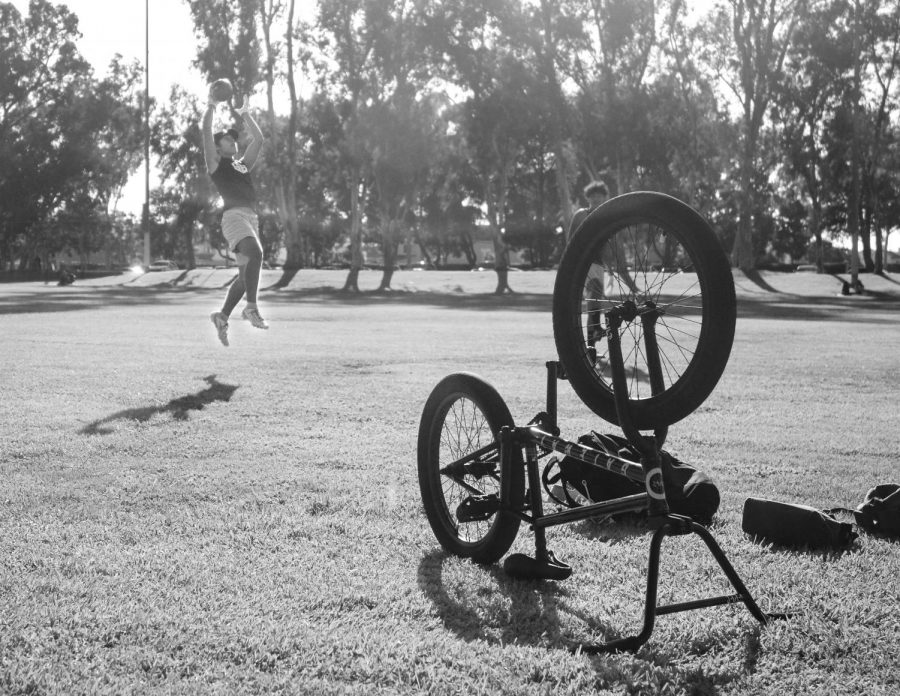The following interview is published in its full form as Mrs. McGee replied. The article in our print issue is solely highlights of the interview, which you will find here as well.
Mrs. Inez McGee, a beloved adviser for Smoke Signals from 1983 – 1996, shares her experiences with the printing process and technological advances, challenges the newspaper faced, and interesting memories she recalls from her time employed at West High.
What was the printing process like when you were an adviser? How often did you print and approximately how much did it cost to print a single issue?
Between 1983 and 1996 during my tenure as adviser our Smoke Signals printing process went through several changes. The newspaper class met 4th period every day. Our first few years we had a four week work cycle. After the staff covered their beat assignments, editors would select stories for their respective pages and make story and photo assignments, set deadlines, edit stories, work with reporters, rewrite stories, and prepare copy for typesetter. A day or two after sending copy to the typesetter, editors received print-ready columns of their stories which they had to fit on their page boards using wax to secure the stories on the pages. They had to trim or cut columns to fit their pages, sometimes having to reform a sentence word by word or letter by letter to fit before sending the finished pages to the printer. The newspaper was delivered to school the following morning and delivered by the staff to all 4th period classes. As our operation became more fully computerized, the staff shortened their work cycle and published every three weeks, thanks to the time saved. I cannot remember the exact cost of each issue because I never saw a bill. However, I think that each issue cost about $1000 to $1500.
About how many people were on Smoke Signals staff each year?
We had about 20-25 staff members each year.
Seeing as you were an adviser for over 10 years (1983 – 1996, correct?), what types of changes and technological shifts did you experience with Smoke Signals that came along with the shift in decades?
During the first few years of my 1983 to 1996 tenure, we had a bright, computer-savvy, non-staff, freshman typist who volunteered to type and print our stories in the “new” computer lab. (That typist tried out for the staff the next year and eventually became a page editor.) The print-outs were delivered to the typesetter. Soon we were able to get our own computers, enabling our editors to type and print their own stories, which eventually allowed us to send our copy to the typesetter on a disc. That saved time and money and gave us more control over the print-ready copy that was returned to us. According to the typesetter, we were the first high school newspaper staff to do so.
How long did you work at West and what did you teach?
I taught at West from 1983 to 1996 and was hired to take over the newspaper when the former adviser resigned. In addition to teaching Journalism I and advising the Smoke Signals staff, I taught sophomore English, which was divided into one semester of literature and one of composition. West High was selected to test the viability of having a computer lab for English, which allowed us to teach composition in a classroom that had a Macintosh computer for each student.
Why or how did you first become involved with Smoke Signals?
Because of declining enrollment in the ‘70s and ‘80s, school districts were not able to hire full time teachers, so I had been teaching English and government at South High School and several Palos Verdes high schools on year-long assignments when Principal Dr. Arnold Plank at West High phoned me about the opening. Although I loved teaching and had taught English, history, U.S. government, music education, Spanish I, and behavioral science during a twenty-year period, I had not taught journalism and did not think that I should accept the position. When I was asked a third time, I decided to talk to the best journalism adviser in the area and was directed to Jolene Combs, who happened to be at Redondo High School at that time. I heard that she was an outstanding newspaper adviser from a newspaper family.
During our visit Mrs. Combs was gracious and straightforward. At the end of our conversation about my background, she said that she was confident that I was definitely qualified to accept the position. Thus, I told Dr. Plank that I would advise the Smoke Signal staff and teach English at West High.
Mrs. Combs eventually taught journalism at El Camino J.C. and was considered the best journalism teacher not only in California but also in the country. How blessed I was to have her as a mentor! She is now deceased.
What were the biggest challenges of being a newspaper adviser?
Because I was new, I told my first staff that although I was a novice in journalism, together we would create a paper that they and our West High community would respect. I had already met some of the new Smoke Signals editors at a journalism workshop a few weeks before the opening of school and knew that they were a dedicated and talented group. However, they had shared with me that they were very uneasy because the entire editorial staff had graduated in June. They had been cub reporters the previous school year and were very worried about being inexperienced editors with a novice adviser. As it turned out, several brilliant, creative sophomores, juniors, and seniors signed up for Smoke Signals that fall, resulting in a production staff that quickly became a productive, cohesive, and professional one under the leadership of totally committed editors.
This set the course for the years that followed. Each year bright, enthusiastic students went through an application process controlled by the editorial board, who knew that their success the next year depended on their selecting sincere, hardworking, and creative staff members.
What was your favorite part about running Smoke Signals?
The best part of being the adviser of the Smoke Signals staff was working with outstanding, caring students who were totally dedicated to producing the best paper possible. It was thrilling to witness the professionalism and excellence that was the hallmark of every staff member: editors, reporters, cartoonists, and photographers. They appreciated having the same rights, responsibilities, and limits of professional journalists, guaranteed to them by the California State Ed Code 48907, and they understood the responsibilities that it entailed.
I also enjoyed the interesting and varied topics editors selected for their cover stories and opinion pieces such as topics like bulimia (then a newly identified problem for teens), abortion, political correctness, restrictions on free speech, harmful relationships, war, commercialism of Christmas, USSR President Gorbachev’s Perestroika, sexual practices, homosexuality, the introduction of condom machines in gas stations, etc.
In addition, it was heartwarming for me when the staff received top awards based on eight of their newspapers each year in a national competition and when individuals received awards during the school year when participating in Southern California weekend journalism competitions.
What do you do now/are you still involved in journalism?
Because my husband and I both have wanderlust, after retiring from teaching we sold our Redondo Beach home and went on the road in a 35 ft. motor home for two years prior to buying a home on a golf course in Arizona. Having already traveled to every state and many foreign countries, during our retirement we have enjoyed exploring the West from the source of the Mississippi River through Wisconsin south to Texas, west into Mexico and Southern California, north along the entire Pacific Coast into Canada and Vancouver Island, and then east again…. plus all places of interest in between. Since we are spending more time in Idaho now, we have been exploring the mountains here and in nearby Oregon. We also have been involved with our family, church, and community activities in Arizona and Idaho.
Presently we spend part of the school year in Idaho to enjoy being near our granddaughters in order to attend their winter sports and school activities. Recently, I was invited to speak to the newspaper staff at my granddaughters’ high school. This semester their school reactivated their school newspaper, which had been dropped from the curriculum more than ten years ago because of publication costs. This is where Smoke Signals enters the story.
After visiting with you in your publication room during West High’s 50th Anniversary celebration, I told my son Dan, a 1982 West graduate, that West was publishing Smoke Signals online at a much lower cost than when I was the adviser. This caught his interest because he is the current assistant principal and athletic director at his daughters’ high school in Idaho. Realizing that this could be the solution for restoring their school’s newspaper, he talked to Ms. Marsiglia about your operation and shared the info with his fellow administrators, who agreed to reinstate their school paper this semester.
Our granddaughter Morgan signed up for the newspaper class and mentioned to her teacher that her grandmother was a retired journalism teacher. This resulted in my being invited to talk to her adviser and newspaper staff. A truly enjoyable experience.
Any other memories, anecdotes, comments, or pertinent information you’d like to add?
1. While students were meeting a deadline one afternoon about 4 PM, an administrator hurried into our publication room and said that we had to close down immediately because the Rodney King incident triggered rioting downtown Los Angeles and the rioters were moving south toward Torrance. West High and all other schools in the district were to be closed ASAP and students were to return home. Rather than fleeing in a panic, the newspaper staff started to interview those administrators, teachers, and students who were preparing to leave the campus and wrote a story about the affair for the upcoming issue.
2. On several occasions the Smokes Signals staff and I defended their editorial freedom guaranteed by Ed Code 48907 when it was challenged.
3. I consciously avoided sharing my personal opinions, interests, or ideas with the staff to prevent their feeling compelled to include them in their stories. Thus, I was delighted when my family, friends, and colleagues were shocked when Smoke Signals stories covered topics, ideas, and opinions they knew contradicted my own. Their surprise assured me that my desire and responsibility to protect the staff’s journalistic freedom was working.
4. The camaraderie and passion for Smoke Signals that developed among staff members was heartwarming. It was more than a “job” to them. For many, it was their life even though they were all excellent students who were successful in many disciplines. Many graduated with honors, received scholarships, and went on to colleges and universities from Stanford and UC schools like Berkley and UCLA to Harvard, Yale, and Brown as well as area colleges and are now working in a variety of professions, including business, medicine, law, journalism, book publishing, etc.
The humbling culmination of my 33 years of involvement at West – first as the wife of a coach, then as the parent of a student athlete, and finally as a teacher – came the summer before I retired when a committee of professional journalists sent me a letter explaining they selected me runner-up as California Journalism Teacher of the Year. This was truly a shock because I had no idea that such an award was given. They said that they were very impressed with the recommendations that they had received on my behalf, and after evaluating all the nominees, they were going to choose me. However, they then received a last-minute nomination from a high school newspaper staff about their wonderful adviser who had died recently. The committee’s letter explained that it was a very heart-wrenching account about the dedication of the adviser, ending with her students’ wish to take the award to her gravesite as a final honor. Because it was a very compelling story and request, the committee explained in an apologetic manner that they decided to grant a posthumous award to the deceased adviser. In their closing remarks, however, they asked me if they could consider me again for the award the following year. I was truly honored to be so recognized but declined their kind offer because my husband and I decided to retire that year and “go on the road.” I also decided not to tell anyone except my husband about it as I had already received a great deal of recognition, support and appreciation from my students and the West High community and wanted to keep the focus on my students and their accomplishments.
Every morning while walking onto the West High campus on the way to my classroom I thanked God for being able to teach at such a wonderful school. I loved my students, the faculty, administration, parents, clerical staff, and janitorial staff.





